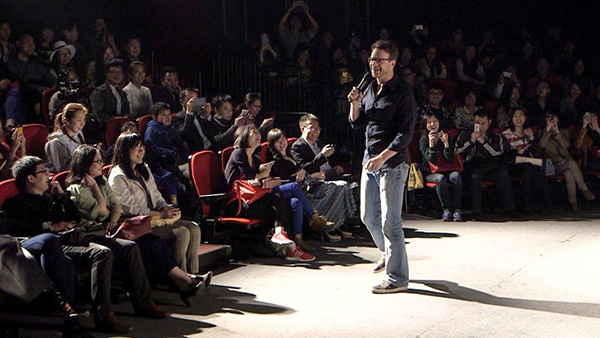 |
|
Mark Rowswell, or Dashan, performs stand-up comedy at the Beijing Stand-up Comedy Club in Beijing in October 2014. [Photo provided to China Daily] |
He had spent most of the previous decade acting as a cultural ambassador between his home country and China, assisting the Canadian Olympic Committee during the run-up to the 2008 Beijing Olympics and appearing at every Canadian prime ministerial state visit to China over that period.
But after Expo, he felt this second phase of his career had led him to a crossroads. "[Expo] felt like a culmination of everything I'd been working on for 15 years," says Rowswell. "But now what do I do? I've still got 15 years left in my career.
"That's when I started to make a turn and say, I don't want to be a diplomat or a government representative," he continues. "I've actively avoided comedy for 15 years: It's time now to go back, but do it my way."
It took Rowswell a while to find the best route back into comedy, but in 2012 he started to notice a change in Beijing's stand-up scene. "Instead of stand-up just being something that was purely the expat community, here you've got it spilling over into Chinese society with Chinese people doing it," he says.
He felt like he had stumbled on the start of something big. "Chinese society now feels very much like the 50s and 60s in the West," he recalls thinking. "You've got the rise of a counter-culture. You've still got Middle America watching network TV, but you've also got beatnik culture, hippie culture, the rise of individualism that gave birth to stand-up."
"We're seeing the same social progress in China," he continues. "All the kinds of culture that are popular here now are things that are highly individualistic—wild and wacky. So in that sense I felt that the ethos of stand-up fits China, and in 2012-2013 I came to this realization: This is what I can do!"
But launching a new career as a stand-up comedian was easier said than done. For one thing, it was terrifying. "Comedians often talk about comedy being like a muscle, and it's true," Rowswell confesses. "You take two weeks off, and you feel flabby. Well, I had been actively avoiding comedy for 15 years! I had built up this kind of phobia."
It took the Irish-American comedian Des Bishop, himself on a mission to promote stand-up comedy in China, to coax Dashan back into a comedy club."Des Bishop was a big break for me. He said to me, 'Come out to one of these gigs, just come out and do three minutes, I won't tell anyone you're coming,'" Rowswell recalls. "So I did that, and he helped me break the ice and figure out how we're going to bridge these two worlds."
But the stand-up scene in China was even smaller then than it is now, and even after Bishop had introduced Rowswell to stalwart comedy venues like the Beijing Bookworm and KungfuKomedy, he still was not doing enough gigs to hone his craft.
"At that time, I was just travelling around China trying to meet the people in clubs that were doing this and just knocking on the door and saying, 'Hi, I'm Dashan, can I do a gig with you?'" he jokes.